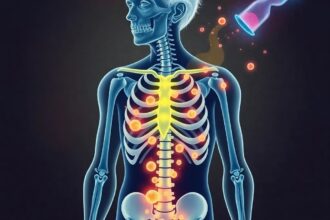Chronic inflammation is a key driver of modern diseases like heart disease, diabetes, and cancer. This article explores its causes, effects, and evidence-based strategies for prevention.
Chronic inflammation, often unnoticed, is a major contributor to modern diseases. Understanding its mechanisms and adopting preventive strategies can significantly improve health outcomes.
Understanding Chronic Inflammation
Chronic inflammation is a prolonged inflammatory response that can last for months or even years. Unlike acute inflammation, which is a protective response to injury or infection, chronic inflammation can damage tissues and organs, leading to various diseases.
According to Dr. Andrew Weil, a renowned integrative medicine expert, Chronic inflammation is the root cause of many serious illnesses, including heart disease, many cancers, and Alzheimer’s disease.
This statement underscores the importance of addressing chronic inflammation to prevent these conditions.
The Biological Mechanisms
Inflammation is a complex biological response involving immune cells, blood vessels, and molecular mediators. Acute inflammation is characterized by redness, heat, swelling, and pain, which are signs of the body’s healing process. However, when inflammation becomes chronic, it can lead to tissue destruction and fibrosis.
Research published in the Journal of Clinical Investigation
highlights that chronic inflammation is driven by the continuous activation of the immune system, often due to persistent irritants like poor diet, stress, and environmental toxins.
Lifestyle Factors Contributing to Chronic Inflammation
Several lifestyle factors contribute to chronic inflammation. A diet high in processed foods, sugar, and trans fats can trigger inflammatory responses. Stress, lack of sleep, and exposure to environmental toxins like pollution and chemicals also play significant roles.
Dr. Mark Hyman, a functional medicine expert, emphasizes, The foods we eat, the stress we endure, and the toxins we are exposed to all contribute to the inflammatory load in our bodies.
This highlights the need for a holistic approach to reducing inflammation.
Evidence-Based Strategies for Reducing Inflammation
Adopting an anti-inflammatory diet rich in fruits, vegetables, whole grains, and omega-3 fatty acids can help reduce inflammation. Regular exercise, stress management techniques like meditation, and adequate sleep are also crucial.
Studies have shown that omega-3 fatty acids, found in fatty fish and flaxseeds, can reduce levels of C-reactive protein (CRP), a biomarker of inflammation. Curcumin, the active compound in turmeric, has also been shown to have potent anti-inflammatory properties.
Emerging Therapies
Emerging therapies for chronic inflammation include anti-inflammatory drugs and natural compounds. Biologic drugs that target specific inflammatory pathways are being developed, offering hope for more effective treatments.
Natural compounds like curcumin and resveratrol are also being studied for their potential to modulate inflammation. According to a study published in Advances in Experimental Medicine and Biology
, these compounds can inhibit inflammatory pathways and reduce the risk of chronic diseases.
Conclusion
Chronic inflammation is a silent epidemic that fuels many modern diseases. By understanding its mechanisms and adopting preventive strategies, we can significantly reduce the burden of these conditions. Emerging therapies offer hope for more effective treatments, but lifestyle changes remain the cornerstone of inflammation management.




